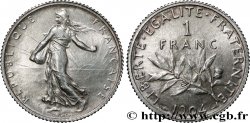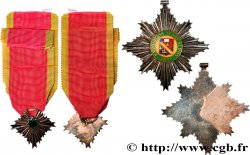fme_466310 - III REPUBLIC Plaquette pour les hospices civils de Saint-Etienne
无库存.
所有在网站上销售的产品 (2018)
价格 : 180.00 €
所有在网站上销售的产品 (2018)
价格 : 180.00 €
种类 Plaquette pour les hospices civils de Saint-Etienne
日期: 1944
铸币厂名称/城市 42 - Saint-Étienne
材质 bronze
直径 67,5 mm
模子方针 12 h.
硬币制模工 DUPRÉ Georges (1869-1909)
重量 97,93 g.
侧面 lisse + corne BRONZE
关于品相的说明
Plaquette présentant de petits coups sur la tranche. Bel aspect et beaux reliefs avec une légère usure sur les points hauts
正面
正面的文字 ANÉPIGRAPHE.
正面的说明书 Femme debout, sein dénudé, portant un enfant à gauche, un vieillard à ses pieds à droite et un jeune enfant à gauche ; au fond une ville industrielle avec des usines visibles en premier, il s’agit de la ville de Saint-Etienne ; signature du graveur en bas à gauche : G. DUPRE.
背面
背面的文字 HOSPICES CIVILS / DE / SAINT-ETIENNE (EN TROIS LIGNES).
背面的说明书 Éléments placés en plans successifs avec au premier plan les armoiries de la ville posées sur un cartouche, sur lequel est gravé “Dr FONTANILLES / Année - 1944” puis des malades et enfin un bâtiment ; à gauche un cartouche sous un cratère avec l’inscription “FONDATION / DE LA CHARITE / -1682- / DE L’HOPITAL / XII SIECLE” ; signature du graveur en bas à gauche : G. DUPRE.
评论
Georges Dupré, né à Saint-Étienne le 24 octobre 1869 et mort à Paris en juin 1909, est sculpteur et graveur-médailleur français.
Il a été l'élève d'Oscar Roty et de Gabriel-Jules Thomas. Il est membre de la Société des artistes français depuis 1902 ou il obtint une mention honorable au Salon des artistes français en 1893. Il décroche le Premier Grand Prix de Rome de gravure en médailles et pierres fines en 1896.
Au Salon de peinture et de sculpture, il obtient la médaille de troisième classe en 1899, la médaille de deuxième classe en 1901, puis la médaille de première classe en 1904.
Article sur l’hopital de la charité de Saint-Etienne :
https://archives.saint-etienne.fr/article.php?laref=291&titre=hopital-de-la-charite-.
Il a été l'élève d'Oscar Roty et de Gabriel-Jules Thomas. Il est membre de la Société des artistes français depuis 1902 ou il obtint une mention honorable au Salon des artistes français en 1893. Il décroche le Premier Grand Prix de Rome de gravure en médailles et pierres fines en 1896.
Au Salon de peinture et de sculpture, il obtient la médaille de troisième classe en 1899, la médaille de deuxième classe en 1901, puis la médaille de première classe en 1904.
Article sur l’hopital de la charité de Saint-Etienne :
https://archives.saint-etienne.fr/article.php?laref=291&titre=hopital-de-la-charite-.








 对产品描述纠错
对产品描述纠错 打印
打印 分享我的选择
分享我的选择 提问
提问 Consign / sell
Consign / sell
 产品介绍
产品介绍



